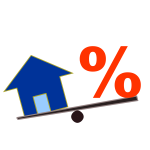As spot Sora trends downwards, floating mortgage interest rates may roll back to 2 – 2.5 per cent soon for home loans.

The daily Sora has been trending below 3 per cent in recent weeks. While some may argue that the daily Sora swings wildly from day-to-day, SORA is actually considered the most stable due to its calculation methodology and also because (unlike SIBOR and SOR) it is compiled and validated by MAS. By 2024, all floating interest rates will be based on the SORA as SIBOR and SOR will be phased out in Singapore.
And the daily Sora shows that the trend is generally trending downwards.

Some analysts have predicted that if this downward trend continues, the 3-month compounded Sora value will drop back to almost 2 per cent by the middle of March 2023. Compounded SORA is computed by compounding the published SORA rates over the historical 3-month, period.
For example, for a 3M compounded SORA rate on the 25th of December 2022, the previous daily SORA rate from 25th September 2022 onwards is compounded over the next three months. Compounded Sora is published by MAS alongside SORA at 9am on all business days in Singapore.
As most mortgages in Singapore are pegged to the 3-month compounded Sora we may see prevailing floating mortgage interest rates roll back to 2 – 2.5 per cent soon, with 2-year fixed rates almost halving to 2.5 per cent from a recent high of 4.5 per cent.
But all of this could be wishful thinking as well. With the Central Bank of America (Federal Reserve System or FED), indicating that it will not be appropriate to cut interest rates this year, the daily Sora could shoot back upwards again soon.
SORA is the volume-weighted average rate of actual borrowing transactions in the unsecured overnight interbank SGD cash market in Singapore. It is administered by the Monetary Authority of Singapore (MAS), and published at 9am on the next business day in Singapore. The phrase “volume-weighted average” sounds daunting, but it simply means that the calculations consider the actual amount being lent. Think of it this way: when calculating SORA, the interest rate for a S$100 million transaction is 5 times more important than the interest rate on a S$20 million transaction.
The drop in Sora in recent weeks may suggest that liquidity conditions in the interbank money markets here are easing, as cash supply far outpaced demand. Borrowing in the interbank market is the most immediate source of bank liquidity and, aggregate activity in the market can therefore be an important indicator of the functioning of the banking market. And if liquidity conditions in the interbank money markets are indeed easing, it could spell trouble for Singapore’s economy in 2023.
All this could just mean more uncertainties and higher payments for homeowners who need to service mortgages.
Such uncertainties would only add to the worries of homeowners with floating mortgage interest rates who got notices that their home loan rate is going to go up to 4 per cent in 2023.
Some were surprised by the home loan interest rate hike, and perhaps regret the fact that they did not do refinancing earlier. Others may have opted to do lump sum prepayments. We have heard home loan customers say that their interest rates have risen from 1.1% when they first started, to now about 3.8%. This was not something they expected.
A good refinance advice anyone could give you is to compare rates and fees from three to four lenders before you decide on one.
With a good number of local and foreign financial institutions here, the choice of a lender and its packages can be mind boggling. Imagine having to compare over hundreds of different loan packages and wondering which is best for you. Even if you are a specialist in finance, differences between the loans in Singapore are not so straight forward, because there are quite a few variables.
If you are uncertain about the uncertainties of the mortgage interest rates, you should speak to a home loan specialist. A home loan specialist will be able to simplify the technical terms for you and help you compare mortgages so that you get the best home loan. The services of home loan specialists are free, so new home buyers have nothing to lose and everything to gain by engaging them.
Payments over the total term of a floating rate mortgage for your new home purchase will vary by design. The interest rate usually starts off low (thus the attraction), but it can later rise. If you opt for a floating rate, you will pay a fixed interest rate for a predetermined time period (usually three years or less), followed by periodic rate adjustments for the remainder of your loan’s term.
This rate is normally a set number of points over a widely published rate, such as the Singapore Overnight Rate Average, or SORA. If that rate rises (or falls), so do your monthly payments.
“I anticipate that the floating mortgage interest rates will increase by 0.5 per cent to above 1.5 per cent by the end of the year,” said Mr Paul Ho, chief officer at iCompareLoan.
“Keeping in mind the rising mortgage interest rates, home owners have to review their mortgages and go for repricing or refinancing to better manage their home loans,” he added.
Home owners who do not have the time to shop for a good refinancing package should speak to mortgage brokers. Mortgage brokers are specialists who are well versed with the banking loan process and have access to hundreds of mortgage and loan packages across many banks. Mortgage brokers help property buyers to get the best home loans and home owners to refinance home loans.
Today, consumers have a wide range of home loan packages to choose from compared to several years ago. Home loans could also be tied up with other programmes which rewards customers with a higher interest rate on their deposits if they transact more with the bank, such as getting a home loan and crediting their salary with the same bank.
Typically, with mortgage loans you are offered attractive rates for the first three years when you refinance – following which the interest rates are adjusted upwards. This usually coincides with the end of the lock in period, offering borrowers a good opportunity to relook their loans.






